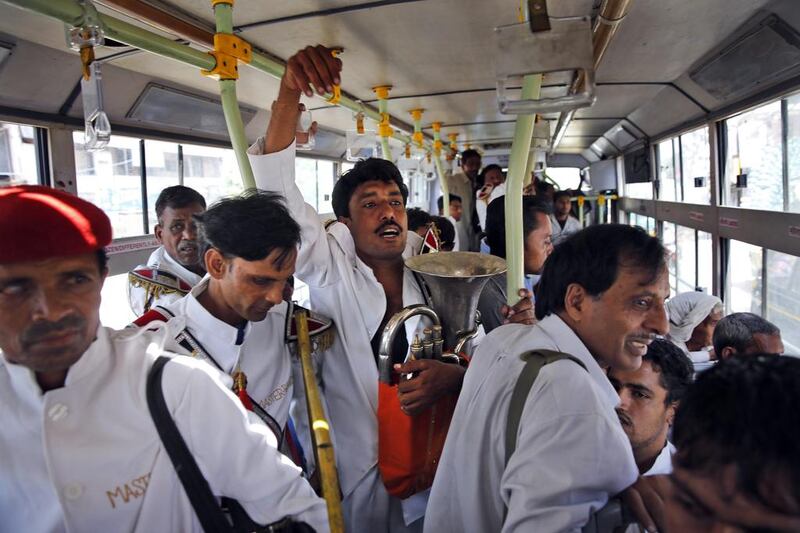NEW DELHI // The wedding season is in full swing in India, marking what should be the busiest time of year for the traditional brass bands that lead raucous processions announcing the arrival of bridegrooms to the neighbourhood.
Dressed in faded military-style uniforms, or long silken tunics and turbans, brass bands playing the latest Bollywood tunes have long been a must-have at any Indian wedding.
But as the tastes of young, wealthier Indians shift to more modern music, young couples increasingly choose DJs playing electronic music instead of live bands. The shift is leaving band owners and musicians struggling to find gigs, exacerbating an already difficult existence.
Poor wages, irregular work hours and endless travel eventually take their toll, said Shanawaz Ali, a bandmaster who plays several instruments.
“At the end of more than 35 years of playing in different bands, I have no savings. Nothing,” said Mr Ali, who has urged his children to take up other trades. “There is no future in the band musician’s profession.”
Most members of the nearly 100 wedding bands that operate in and around Delhi come from villages in neighbouring Uttar Pradesh state, and many are related by blood or marriage.
And away from the bright lights of wedding processions, it’s a tough life for the musicians, with lots of travel, long hours and inconsistent pay.
Hindu weddings in India generally take place on around 90 days throughout the year that are deemed auspicious by astrologers — mostly during the winter months. Musicians typically sign contracts with band owners for about US$1,000 (Dh3,600) a year. The rest of the time they return to their villages where they eke out a living as construction workers, painters or farm labourers.
A typical day during the wedding season begins in the afternoon, when 15 to 20 musicians gather at the band owner’s home to change into uniforms and collect the instruments. These include trumpets, drums, saxophones, cymbals, clarinets, oboes and maracas, and all are usually battered from long years of use.
Then begins a long evening stretching into the late hours as the musicians travel by bus or train to the groom’s home, where they wait for him to emerge.
When he does, usually astride a white stallion, the band begins to play, marching ahead of the horse as the groom’s friends and relatives dance all the way to the wedding venue. Once the procession reaches the bride’s home or the hotel where the wedding is held, the band musicians wait outside, playing cards or watching movies on their cellphones.
They play again when the wedding ceremonies end hours later and the newlyweds leave.
“Often it is past midnight when we return to our lodgings and return the uniforms, before turning in for the night,” said Mr Ali, the band master.
During wedding season, most band players sleep in cramped quarters in the outer suburbs of Delhi. More than a dozen are usually packed into a room, their instruments and clothes hanging from hooks on the grimy walls.
“We are all related, so we’ve learnt to adjust, but sometimes it becomes a bit too much,” said Raees Ahmed, coughing and drawing on a thin cigarette.
Band owners are also feeling the pinch as their margins shrink.
Sanjay Sharma, the current owner of the Master Band troupe, recalls days from his childhood when his father started the band company.
“Weddings were small, family affairs, where all the music was provided by the band,” he said. “Today, the wedding ceremonies are spread over days and except for the part when the groom arrives, young people want to dance to the latest pop and electro music provided by DJs.”
Some band owners have tried hiring DJs, but say they could not adjust to the music or afford the electronic equipment required.
“It’s different music, a different pace,” said Mr Sharma. “I can’t relate to it.”
* Associated Press





